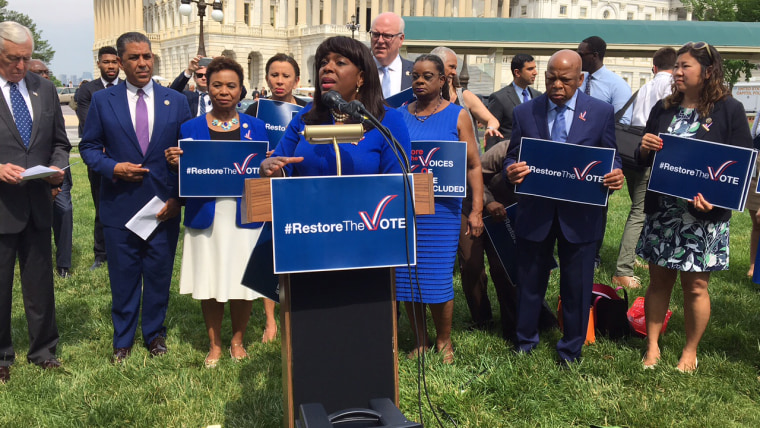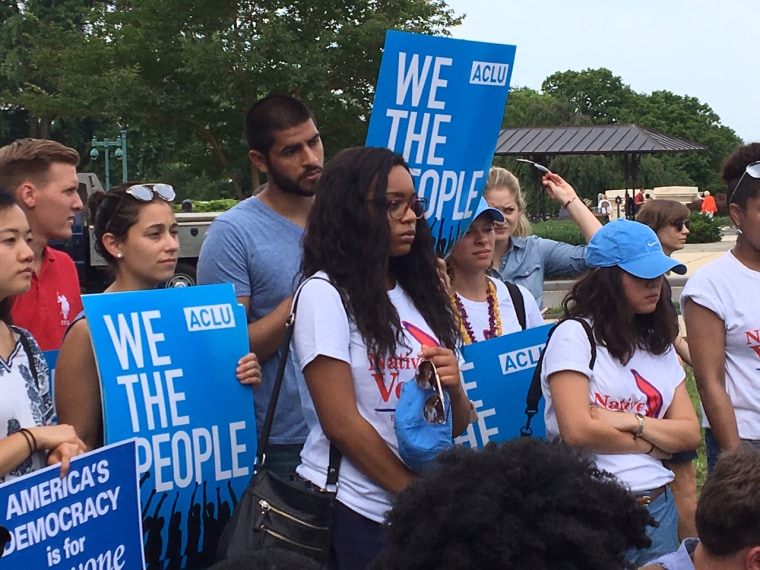House Democrats introduced legislation Thursday to restore parts of the Voting Rights Act while pledging to make the issue of voting rights a priority if the party wins in 2018.
On the eve of the four-year anniversary of the U.S. Supreme Court decision that struck down key parts of the VRA, Rep. Terri Sewell, D-AL, told a crowd of voting rights advocates and supporters gathered on Capitol Hill that it is time to “restore the promise of voter equality.”
“Today, I’m introducing the Voting Rights Advancement Act because I believe that the right to vote is one of the most fundamental rights in our democracy,” Sewell said. “As state after state create new barriers to the polls, our work to prevent discrimination and protect the rights of all voters has taken on a new urgency. The time to restore the vote is now.”

The Voting Rights Advancement Act (VRAA) aims to modernize Section 4 of the VRA that the Supreme Court ruled in Shelby County v. Holder was outdated on June 25, 2013. Under the new act, local and state governments with a history of voter discrimination from the past 25 years would have to obtain federal approval before making changes to voting policies or procedures.
These states would include: Alabama, Arkansas, Arizona, California, Florida, Georgia, Louisiana, Mississippi, New York, North Carolina, South Carolina, Texas and Virginia.
The bill has 180 Democratic co-sponsors, but has yet to garner support from across the aisle. Without it, the bill cannot forward in the Republican-controlled chamber.
Minority Leader Nancy Pelosi, while calling on her GOP colleagues to make it a bipartisan measure, said the bill "will be introduced on the very first day" Democrats regain control of the House in 2018.
“We want people to understand they have the right to vote and their vote will be counted and counted as cast. Many people sacrificed so much for the right to vote in our country,” Pelosi said. "You have our commitment that this will become the law when we become the majority and we want it to become the law even before then."
Related: OpEd: The GOP Colluded With Racism to Hack North Carolina Election
Rep. John Lewis, the prominent civil rights activist, said restoration of the voting rights act is needed now more than ever.
“Some of us, gave some time in jail. Some of us gave a little blood. Some of us died for it. And we must not be at home with ourselves until the vote is restored,” Lewis said. “We must do it not just for us, not just for this generation but for generations yet unborn. The ability to vote must be as easy as getting a clean glass of water.”
The VRAA would allow courts to issue an injunction immediately if they find that an election change is discriminatory instead of waiting for higher courts to decide. NAACP Washington Bureau Director Hilary Shelton said that this is key to ensuring “every single American has the right to cast an unvetted vote and indeed have it counted.”
“It is outrageous that four years ago one of the crucial tools to prevent voter discrimination, to prevent voter suppression has been nullified by a Supreme Court on a 5-4 decision,” Shelton said. “Before they broke the Voting Rights Act we were moving to make it better for everyone, to make sure election protection was there for everyone. Does it not make sense that on your 18th birthday, you are automatically registered for the draft you should not automatically be registered to vote? It makes sense.”

In April, a Texas judge found the states’ controversial voter ID law intended to discriminate against minorities. The following month, the Supreme Court declined to hear North Carolina’s appeal of a lower court’s ruling that the state’s voter ID law also intended to discriminate against minorities.